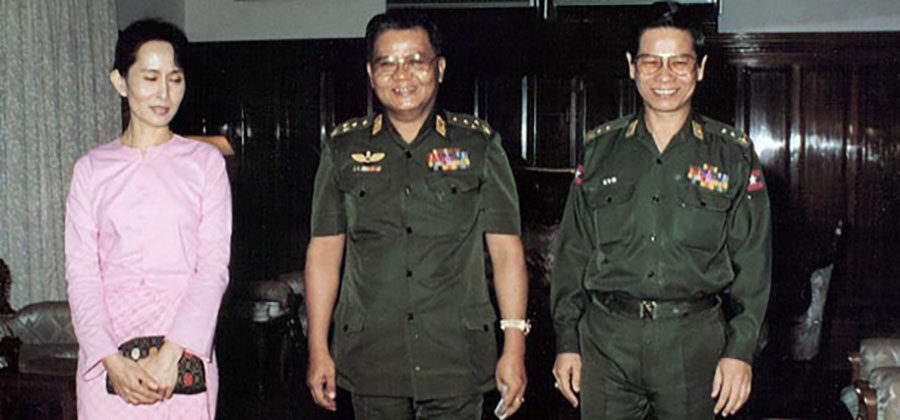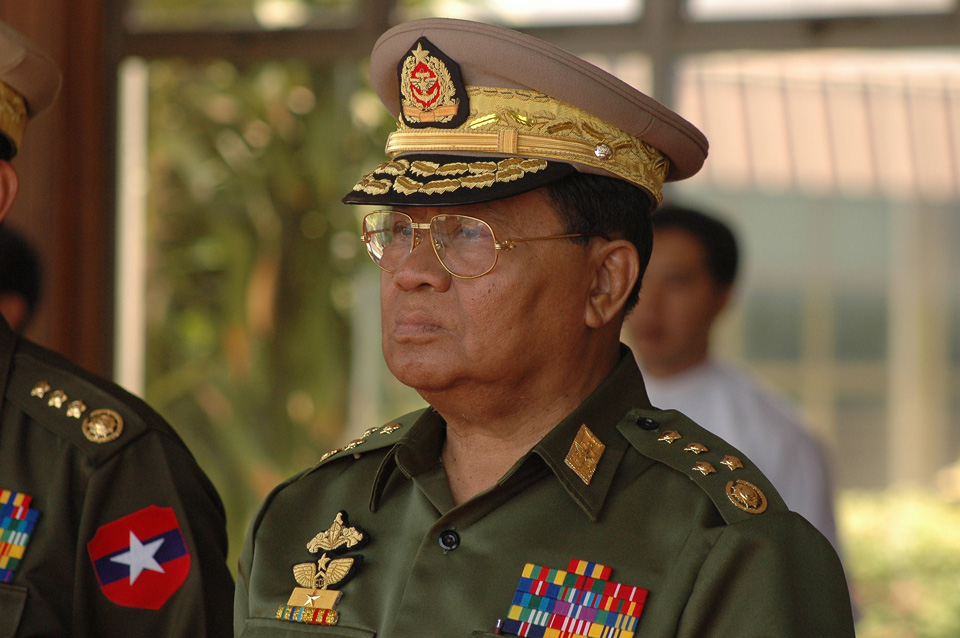ASEAN is expected to scrap plans for its special envoy to visit Myanmar in the wake of the regime’s refusal to allow him to meet detained State Counselor Daw Aung San Suu Kyi. As a result, junta boss Senior General Min Aung Hlaing will likely not be invited to attend the ASEAN summit in Brunei later this month. He shouldn’t be. If he does attend, he will only fill the air with lies, lies and more lies.
One cannot expect the regime to think rationally, but if it were capable of doing so, it would see that allowing ASEAN special envoy Erywan Yusof to meet Daw Aung San Suu Kyi could win it some support in the region and ease the diplomatic pressure it is under. The media would be kept busy reporting on the visit and deciphering the messages emerging from both the envoy and the junta’s celebrated captive. But this will not happen. The die is cast.
If Snr-Gen Min Aung Hlaing’s predecessors were plotting the junta’s strategy, however, they would surely be playing a different game.
Starting in 1989, the previous military junta, first under its chairman General Saw Maung (who stepped down in 1992 citing health reasons) and later the dictator Senior General Than Shwe (who took over as head of the ruling junta) kept Daw Aung San Suu Kyi confined at her lakeside residence. The leader of the pro-democracy movement, later opposition leader, remained a prisoner of the regime intermittently until 2011. During those long years, Than Shwe played a game of catch-and-release with his hostage, occasionally freeing her to ease the pressure on his regime and gain it some legitimacy, applause and aid. It worked. He made a significant blunder in 2003, however, when he ordered thugs and regional commanders to attack her convoy in central Myanmar in 2003; the violent assault prompted global condemnation and more sanctions.
In her early days as a prisoner of the generals, Daw Aung San Suu Kyi was allowed to meet her husband Michael Aris (who died in 1999) and visiting US Congressman Bill Richardson. Later, she was allowed to meet freely with prominent Buddhist monks, UN special envoys, ICRC representatives and some Yangon-based diplomats. They carried her messages to her supporters inside and outside of Myanmar, and to the world at large. The game was played without padlocks.
Before releasing her from house arrest for the first time in July 1995 (she would later be returned to confinement at her home), Snr-Gen Than Shwe and his spy chief Major General Khin Nyunt (later lieutenant general) met with Daw Aung San Suu Kyi in September 1994. Myanmar observers the world over were pleased and pored endlessly over a photo that emerged of the meeting, though no details of what was discussed have ever been published.

Reportedly, whenever they met, Than Shwe avoided discussing politics with Daw Aung San Suu Kyi and steered their conversations toward national development topics.
Of course, the meetings were intended solely to reduce international pressure on the regime; the generals never sought genuine political discussion. But holding the meetings worked in the regime’s favor.
Upon Daw Aung San Suu Kyi’s 1995 release, Japan announced the resumption of ODA assistance. Tokyo subsequently delivered more humanitarian packages, while ASEAN and the world applauded the regime. Two years later Myanmar joined the regional bloc.
Keeping his lines of communication open with Daw Aung San Suu Kyi, Snr-Gen Than Shwe—who was trained as a psychological warfare officer in the 1950s—dispatched his subordinates including Major General Than Tun, Major General Kyaw Win (the deputy intelligence chief and Than Shwe’s then-trusted aide) and Home Affairs Minister Colonel Tin Hlaing to meet her and sound out her thinking.
He warned them in advance to expect fury from the prisoner and instructed them to play “good cop, bad cop”.
In fact, Daw Aung San Suu Kyi got along well with the military officers that Than Shwe sent to meet her; she would go on to develop long-lasting friendships with some of them. She is now 76. They are now also in their 70s, retired and watching the events unfolding in Myanmar with concern.

Sadly, it seems that in all that time she spent unjustly under house arrest, The Lady did not study her captors—the generals—sufficiently to develop a proper understanding of them.
When in power as the de factor leader of Myanmar, State Counselor Daw Aung San Suu Kyi said her relationship with the military that had deprived her of her liberty under house arrest for nearly 15 years, was “not that bad” and that the generals in her cabinet were “rather sweet”.
Rather sweet?
Among Daw Aung San Suu Kyi’s “sweet generals”, two names stand out: General Myint Swe, who served as the military-appointed vice president under her administration, and military chief Snr-Gen Min Aung Hlaing, who would eventually topple her in a coup.
Gen. Myint Swe had a reputation as a hardliner, having served under Than Shwe. His appointment in the National League for Democracy government led by Daw Aung San Suu Kyi alarmed many in the party and the pro-democracy movement. According to the constitution, the military is guaranteed control of 25 percent of Parliament and can nominate a vice president.
An obedient officer, Gen. Myint Swe had overseen several political crackdowns during his career. Military appointees in Parliament nominated the general, who had also served as chief minister of Rangoon Region, as the vice president.
So—did Gen. Myint Swe rock the boat for Daw Aung San Suu Kyi’s government? Did she find him as hard to work with as she had been warned she would?
Before the coup, in 2019 and 2020, Daw Aung San Suu Kyi confided to a close colleague that initially, she had harbored concerns about working with Gen. Myint Swe when she learned the news of his appointment.
To her surprise, however, she found the general easy to work with; Myint Swe did not create any serious issues. Former military officers who know Myint Swe say this is how he was trained: to serve the boss, whether it’s Than Shwe or Daw Aung San Suu Kyi. During the civilian government’s term, Myint Swe and Daw Aung San Suu Kyi got along. When the military staged a coup on Feb. 1, 2021, Myint Swe was named “acting president” after elected President U Win Myint was removed from office, but Myint Swe has not been seen in public since. His situation remains unclear.
There was, however, a thorn in Daw Aung San Suu Kyi’s side throughout her administration.
The State Counselor confided to the same colleague that she couldn’t work with commander-in-chief Min Aung Hlaing. She pressed her colleague for information on the senior general, his thinking and his ambitions.
Today, Daw Aung San Suu Kyi is not being detained at her lakeside villa, but in an unknown location. She faces 11 charges—including absurd accusations like illegal possession of walkie-talkies and misuse of land for a foundation named after her late mother. Two weeks ago the junta accused her of accepting a total of US$600,000 and 7 viss (roughly 11.4 kg) of gold in bribes from the former Yangon chief minister on three separate occasions in exchange for supporting and protecting his businesses. Her brief response to the latest accusations was to call them “all absurd”.
We once thought of Than Shwe as dumb and unsophisticated. Today, Min Aung Hlaing seems even more dimwitted and insecure. The game he plays is so trivial and foolish, and lays bare his deep-seated personal grudges and his hatred of Daw Aung San Suu Kyi.
You may also like these stories:
Myanmar Junta Boss Min Aung Hlaing’s Delusions of Grandeur
Myanmar’s Shadow Govt Reports Junta’s Massacres of Civilians to UN Security Council
US-Thai Cobra Gold Drills Wither at 40
















